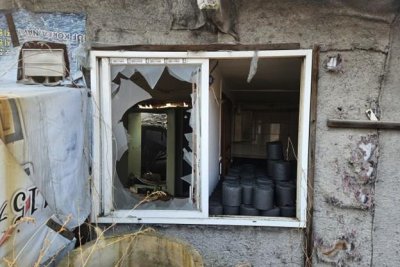Fire displaces residents of Seoul’s Guryong Village shantytown

1 of 2 | Broken windows are seen after a fire swept through Guryong Village in Gaepo-dong, Gangnam district, Seoul, on Thursday. Photo by Asia Today
Jan. 16 (Asia Today) — A pre-dawn fire tore through Guryong Village in Seoul’s Gangnam district on Friday, forcing residents of what is often called the city’s last shantytown to flee with little more than what they could carry.
The blaze broke out around 5 a.m., leaving residents scrambling down the hillside as flames spread through tightly packed homes, according to residents and reporters at the scene.
Kang, 66, said she escaped after a neighbor banged on her door shouting that there was a fire. She said she left behind a gold ring she had saved to give her son for his wedding.
“I left my son’s wedding ring behind,” she said, breaking down as she described saving for years for the gift. She said the wedding date was set for Dec. 22.
By morning, sections of the settlement showed collapsed roofs, charred walls and shattered windows, with household items scattered along the narrow lanes. Coal briquettes stacked for winter could be seen through broken windows.
As black ash hung in the air, residents were urged to evacuate quickly, witnesses said.
Park Cheon-su, 78, who lives in the village’s District 6, said he turned back during the evacuation to retrieve medication he was taking. Despite warnings from firefighters, he said he went back inside.
“Is dying from not taking my medicine any different than dying in a fire?” he shouted, according to witnesses.
Park later emerged holding his medication packets and wearing no shoes, witnesses said. Looking toward the smoke, he said, “The world is truly cruel.” He said he had lived there for 30 years.
After the fire was brought under control, displaced residents gathered at a nearby community center, where they were given food and water, residents said. Some refused to eat, saying they had no appetite.
Noh Jeong-ae, 80, said she grabbed what she could during the escape but ended up with only two scarves. She repeatedly asked what would happen to her home, residents said. Another longtime resident said he did not know where he could go at his age.
— Reported by Asia Today; translated by UPI
© Asia Today. Unauthorized reproduction or redistribution prohibited.
